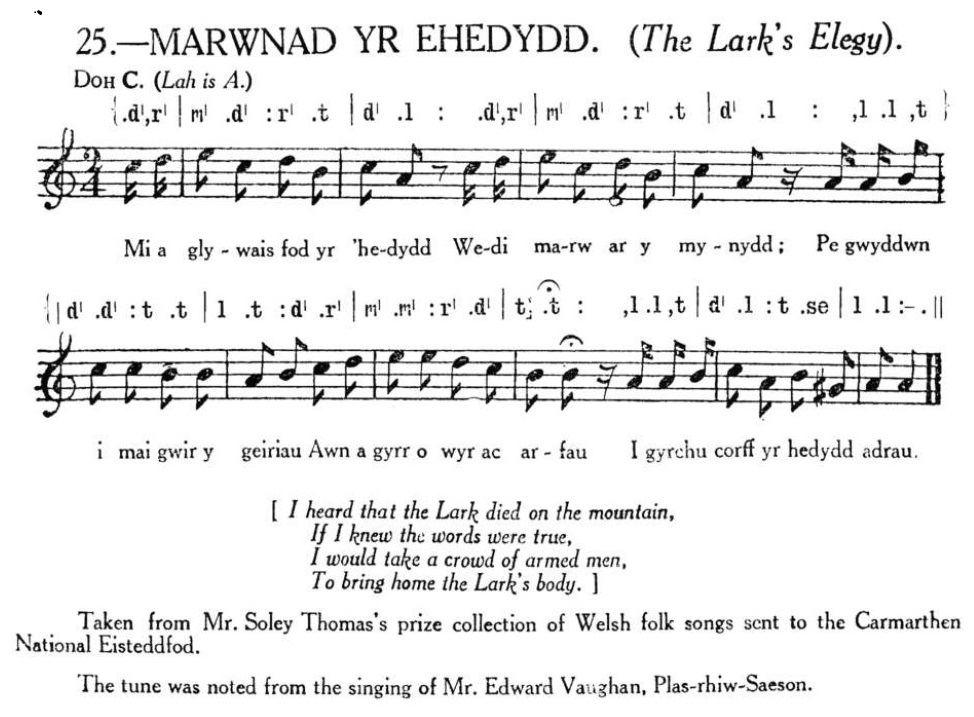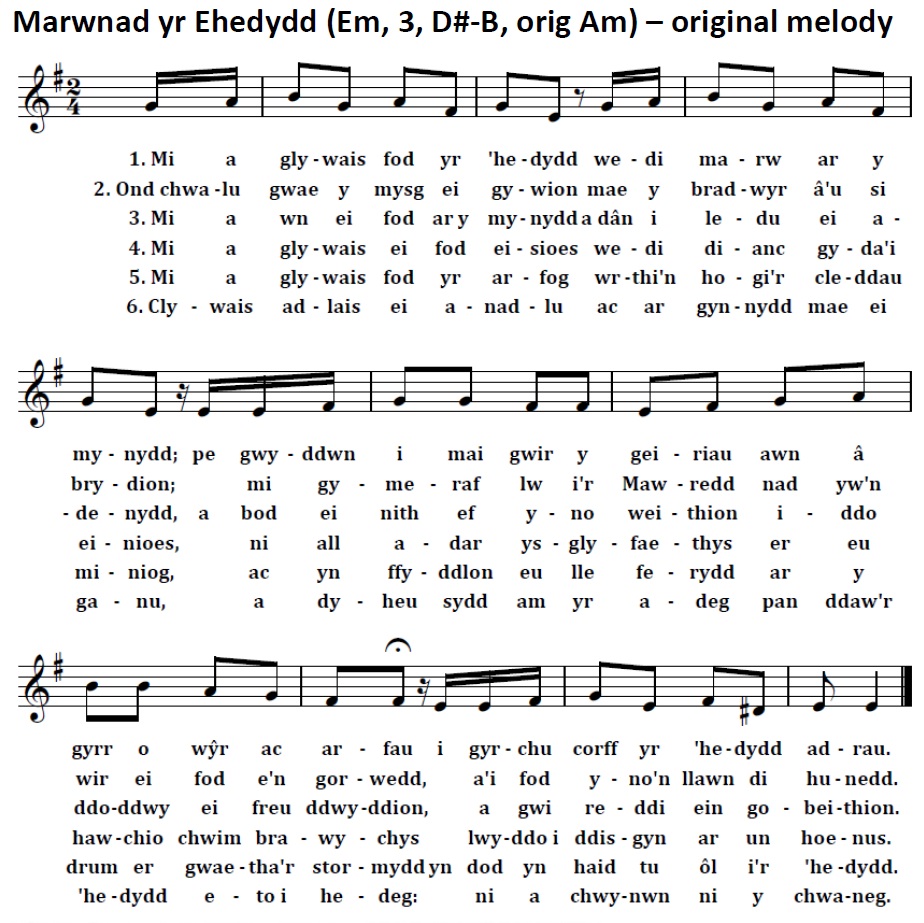
This is a well-known song in Wales, and several versions are sung nowadays. They are based on a single stanza and melody that were published in the Journal of the Welsh Folk-Song Society in 1914. This was collected from a singer near Machynlleth, and it is likely that it is a fragment of a longer and much older song.

There have been at least four attempts to write additional verses. The first was by Enid Parry (Wyth Gân Werin, 1949). The second, and probably the best known now, was by Albert Evan Jones (bardic name ‘Cynan’). Both of these introduce other birds, following on from the subject of the lark in the original first verse. Here is Cynan's version, taken from his book Cerddi Cynan (1959).
1. Mi a glywais fod yr ’hedydd, 1. I heard that the lark Wedi marw ar y mynydd; Has died on the mountain; Pe gwyddwn i mai gwir y geiria’, If I knew these words were true, Awn â gyr o wyr ac arfa’, I would take a group of men and arms I gyrchu corff yr ’hedydd adra. To fetch the lark's body home. 2. Mi a glywais fod yr hebog 2. I heard that the hawk Eto’n fynych uwch y fawnog, Is still often above the peatbog, A bod ei galon a’i adenydd And that its heart and its wings, Wrth fynd heibio i gorff yr ’hedydd As it passes the lark's body, Yn curo’n llwfr fel calon llofrudd. Flutter in a cowardly way like a murderer's heart. 3. Mi a glywais fod cornchwiglan 3. I heard that a lapwing Yn ei ddychryn i ffwrdd o’r siglan Frightened him away from the bog Ac na chaiff, er dianc rhagddi, And that he gets, although escaping from it, Wedi rhusio o dan y drysi, Hidden beneath the thicket, Ond aderyn y bwn i’w boeni. Only the bittern to worry him. 4. Mi a glywais gan y wennol 4. I heard from the swallow Fod y tylwyth teg yn ’morol That the fairies were taking care of Am arch i’r ’hedydd bach o risial, A coffin for the little lark of crystal, Ac am amdo o'r pren afal, And of a shroud from the apple tree, Ond piti fâi dwyn pob petal. But it would be a pity to take every petal. 5. Canys er mynd â byddin arfog 5. For despite taking an armed army, Ac ar codi braw ar yr hebog, And frightening the hawk, Ac er grisial ac er bloda’, And despite the crystal and the flowers, Er yr holl dylwyth teg a'u donia’, Despite all the fairies and their powers, Ni ddaw cân yr ’hedydd adra’. The lark's song will not come home.
Bryn Terfel recorded this version in 2008 on his CD Scarborough Fair. Arfon Gwilym recorded it in 2018 on Youtube for Trac Cymru, an organization for developing folk traditions in Wales.
There is a tradition, difficult to trace with any certainty, which equates the ‘Lark’ with Owain Glyndŵr and attributes the words of the song to one of his outlawed soldiers. Cynan’s version could be interpreted as continuing the veiled reference to Glyndŵr, and introducing other birds as similarly veiled references to other characters in the story of the Welsh uprising (1400-1421). This tradition lies behind the additional verses written by the poet and publisher from the Vale of Conwy, Myrddin ap Dafydd (b. 1956), for the folk group, ‘Plethyn’, in 1979, not to mention a new version he wrote in 2000 to mark the 600th anniversary of the beginning of the uprising. Here is Plethyn's version from their 1990 CD (and lyrics with translation from the sleeve notes): Blas y Pridd / Golau Tan Gwmwl.
1. Mi a glywais fod yr ’hedydd 1. I have heard that the lark Wedi marw ar y mynydd; Has died on the mountain; Pe gwyddwn i mai gwir y geirie If I knew that word were true, Awn â gyrr o wyr ac arfe I’d take a troop of men in arms I gyrchu corff yr ’hedydd adre. To bear the lark’s body home. 2. Ond chwalu gwae ymysg ei gywion 2. But spreading woe among his chicks Mae y bradwyr â’u sibrydion; Are the traitors with their rumour; Mi gymeraf lw i’r Mawredd I vow to the all-highest Nad yw’n wir ei fod e’n gorwedd, ’Tis not true that he is slain A’i fod yno’n llawn dihunedd. But is up there, and very eager. 3. Mi a wn ei fod ar y mynydd 3. I know he is on the mountain, A dân i ledu ei adenydd, On fire to spread his wings, A bod ei nith ef yno weithion And that his nest is there now Iddo ddodwy ei freuddwydion, Where he may hatch his dreams A gwireddi ein gobeithion. And realize our hopes. 4. Mi a glywais ei fod eisioes 4. I have heard that he has already Wedi dianc gyda’i einioes, Escaped with his life; Ni all adar ysglyfaethus The birds of prey, Er eu hawchio chwim brawychys For all the sudden terror of their greed, Lwyddo i ddisgyn ar un hoenus. Will not fall on our lively one. 5. Mi a glywais fod yr arfog 5. I have heard that the armed men Wrthi’n hogi’r cleddau miniog, Are whetting their sharp swords, Ac yn ffyddlon eu lleferydd And true to their word Ar y drum er gwaetha’r stormydd On the ridge in every storm Yn dod yn haid tu ôl i’r ’hedydd. They come in flock behind the lark. 6. Clywais adlais ei anadlu 6. I heard the echo of his breathing Ac ar gynnydd mae ei ganu, And his song is ever rising, A dyheu sydd am yr adeg And there is such longing for the time Pan ddaw’r ’hedydd eto i ’hedeg: When the lark flies again: Ni achwynwn ni ychwaneg. And we will complain no longer.
Here is my sheet-music for singing the Plethyn version. Their melody is a little different to what was originally published, and most people who have recorded this song seem to use this revised melody, but I have stuck to the original. I sing it in the key of E minor rather than the original A minor, giving it a range from D# up to B.
